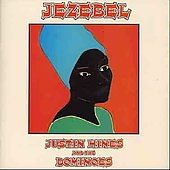Justin Hinds and the Dominoes

by Eric Doumerc
(May 2007)
Justin Hinds began to make records with the Dominoes (Junior Dixon and Dennis Sinclair) forming a Jamaican harmony trio in the early 1960's and later gained some popularity abroad in the 1990's. Sadly, today Hinds and his comrades have remained rather unknown outside the circle of reggae cognoscenti and their music deserves much wider exposure.Justin Hinds was born in the small village of Steertown on the Jamaican north coast in 1942 and came to Kingston to make his way in the music business in the early 1960's. He hooked up with the producer Duke Reid in 1963 and recorded his fist song in the same year with the cream of studio musicians at the time (Tommy McCook on saxophone, Drumbago on drums, Jah Jerry on guitar). The dominant sound at the time was ska and the Dominoes' first song, entitled "Carry Go Bring Come" (a Jamaican phrase meaning a gossip) was recorded in that style, with blasting horns and a driving rhythm. The song was a hit, remained in the charts for seven weeks, and launched Justin Hinds' career, becoming a transatlantic smash with the UK West Indian immigrant community and with the early incarnations of the skinhead movement (the Selecter covered the song in the late '70's and the Specials would later cover it with Desmond Dekker).
Hinds and his friends then recorded exclusively for Duke Reid until the producer's death in 1974 and then began to record for the late Jack Ruby in 1976, a partnership which led to the release of the Jezebel LP on Island, which included a remake of "Carry Go Bring Home." In spite of one of the songs from the LP (the jubilant "Natty Take Over") being included on the soundtrack to the film Rockers, lasting recognition still failed to come and Hinds went into semi-retirement. Although he returned to recording in the mid-1980's when he made an album for the American Nighthawk label (Travel with Love, 1985), he still missed out on the acclaim he deserved. The Dominoes had to wait until the 1990's for international recognition to come when they first performed at the Sierra Nevada World Music Festival in 1996, which led to more touring in the USA and in Europe. Justin Hinds died of cancer in Jamaica on March 17th, 2005.

For Hinds and the Dominoes, their belated recognition may be accounted for by the fact that they recorded in a style which was far removed from the mainstream of Jamaican music but which was nevertheless steeped in the Jamaican oral tradition. Their music (in the ska, rock steady and reggae modes) is best described as "rural" and could be said to belong to a type of reggae music sometimes known as "country reggae." Groups like Stanley and the Turbines and the Ethiopians recorded in a similar style.
The Dominoes' harmonies were church-based and Hinds himself came from a deeply religious family and loved to sing religious hymns in church. Parallel to that, he also liked listening to American popular music and his favourite artists included Fats Domino (hence Justin Hinds and the Dominoes), B.B. King, Smiley Lewis and Louis Jordan.
Hinds' lyrics were influenced both by his religious background and by the Jamaican oral tradition, which is based on storytelling, proverbs, sayings and songs. His first hit, "Carry Go Bring Come," was about a gossip, a "news-carrier":
"This carry-go-bring-come my dear brings misery,Then Hinds states that it is "better to seek a home in Mount Zion high instead of keeping oppression upon an innocent man" and concludes by asking "how long shall the wicked reign over my people."
This carry-go-bring-come my dear brings misery.
You're going from home to home, making disturbances.
It's time you stop doing these things, you old Jezebel."
The song was an immediate hit in 1963, during the ska era, and Hinds later re-cut it the rock steady idiom in 1967, and later as a Reggae song in the 1970s (on the Jezebel LP). The lyrics are a mixture of folk sayings and biblical allusions ("Jezebel", "Mount Zion", "the wicked") which struck a chord with the audience. Everyone was able to relate to the general feelings expressed in the songs about the wicked oppressing the weak. After all, the song was released in 1963, just one year after Jamaica became independent and the colonial legacy was certainly visible at the time.
Hinds had the knack of seizing upon a popular folk expression and turning it into a hit, as with song entitled "Botheration," released in 1965 and re-recorded in the rock steady era:
"Botheration oh! botheration there!These simple, effective lyrics tell of suffering and social deprivation, but without any anger or resentment: the singer uses an age-old phrase and makes it carry the weight of his argument. The interplay between the lead singer's part and the backup singers' chorus is very effective too and the final mix bathed their voices in a ringing echo, which is chilling. Hinds and the Dominoes used proverbs and aphorisms regularly in their songs and examples which spring to mind include "Cock Mouth Kill Cock" (1966) which uses the well-known Jamaican proverb mentioned in the title ("Talking too much may lead to trouble"), "Jump out of Frying Pan" (1965), and "The Higher the Monkey Climbs" (1966):
The people dem a bawl: botheration there!
Tomorrow will be gone. Botheration there!
So everywhere you go, botheration there!"I leap from north to south, botheration there.
I move from east to west, botheration there.
So, everywhere I go, botheration there.
Too much confusion in the city,
Too much botheration on the land"
"The higher the monkey climbs, the more he exposesThe comedy of the situation appears if one pictures the scene described by the proverb: as a monkey climbs up a tree, it exposes its private parts and then becomes the butt (so to speak) of lewd jokes. This proverb rebukes social climbers and upstarts who, once they have reached the top, look down on their former friends.
I'm not tracing nor complaining on those goings
He that exalteth himself shall be abased
Grief always comes to those who love to brag the most
Meekly wait and murmur not
You'd better hold on to what you have got,
The higher the monkey climbs, the more he exposes"
In fact, the excerpt quoted above consists of a string of proverbs and sayings from the Jamaican oral tradition and from the Bible too ("He that exalteth himself shall be abased"). These aphorisms confer upon the singers some kind of moral authority and testify to their religious upbringing. The overall "message" of the song is quite conservative and quietist: the moral seems to be that social climbers and upstarts will one day be brought low and that consequently one should "meekly" accept one's fate without complaining about it.
Hinds and the Dominoes always adopted an unassuming attitude in their lyrics and sang about the people's hard living conditions in a simple manner, which was far removed from the fashionably "dread" fire-and-brimstone rhetoric of so many reggae trios in the 1970's. Maybe that is why they were never really given the recognition they obviously deserved at the time and had to wait until the 1990's to tour internationally.
Justin Hinds died in 2005 in the village where he had been born and, while Duke Reid was alive, never recorded for another producer. He was a man who was faithful to his roots and was a loyal person. His music is the embodiment of these qualities and should be considered as a major contribution to Jamaican culture.
References:
Larkin, Colin, ed. The Guinness Who's Who of Reggae. London: Guinness Publishing Ltd, 1994.
Turner, Michael. "The Greatest Thing is to Know: Justin Hinds (1942-2005)", The Beat, Vol.24, No. 3 2005.